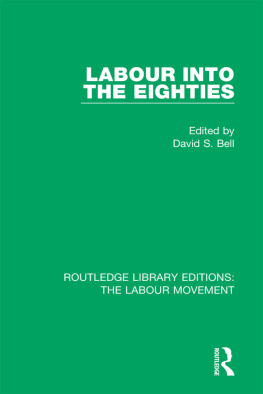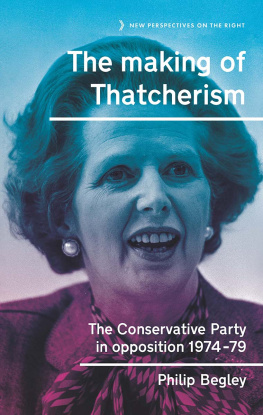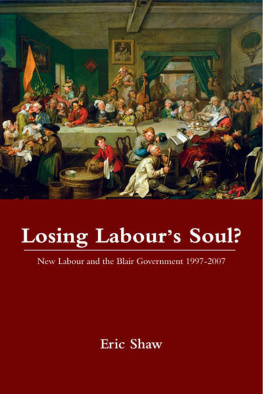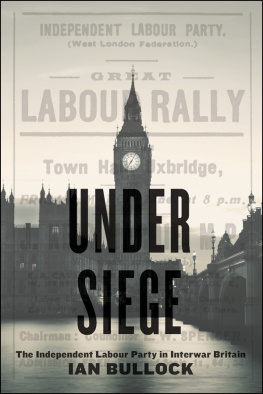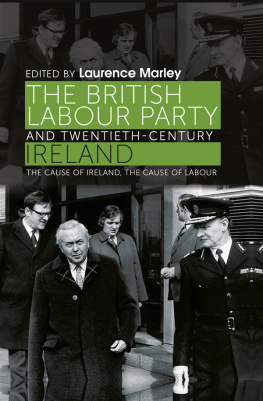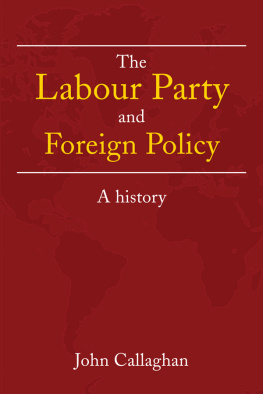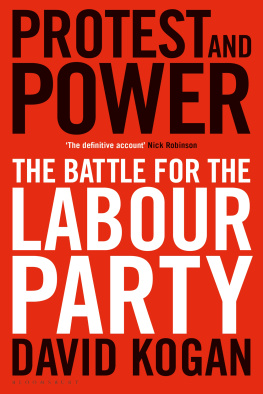THE LABOUR PARTY IN OPPOSITION 19701974
19701974 was a pivotal period in the history of the Labour Party. This book shows how the Labour Party responded to electoral defeat in 1970 and to what extent its political and policy activity in opposition was directed to the recovery of power at the following general election. At a point in Labours history when social democracy had apparently failed, this book considers what the party came up with in its place.
The story of the Labour Party in opposition, 19701974, is shown to be one of a major political party sustaining policy activity of limited relevance to its electoral requirements. Not only that, but Labour regained office in 1974 with policies on wages and industrial relations whose unworkability led to the failure of the Labour government 19741979, and the Labour Partys irrelevance to so many voters after 1979.
Using primary sources, the author documents and explains how this happened, focusing on the partys response to defear in 1970 and the behaviour of key individuals in the parliamentary leadership in response to pressure for a review of policy.
The Labour Party in Opposition 19701974 will be essential reading for students and researchers of political history and the Labour Party.
Patrick Bell lectures in British Politics at the University of Durham. He was previously Lecturer in History at the University of Leeds.
BRITISH POLITICS AND SOCIETY
Series Editor: Peter Catterall
Social change impacts not just upon voting behaviour and party identity but also the formulation of policy. But how do social changes and political developments interact? Which shapes which? Reflecting a belief that social and political structures cannot be understood either in isolation from each other or from the historical processes which form them, this series will examine the forces that have shaped British society. Cross-disciplinary approaches will be encouraged. In the process, the series will aim to make a contribution to existing fields, such as politics, sociology and media studies, as well as opening out new and hitherto-neglected fields.
THE MAKING OF CHANNEL 4
Edited by Peter Catterall
MANAGING DOMESTIC DISSENT IN FIRST WORLD WAR BRITAIN
Brock Millman
REFORMING THE CONSTITUTION
Debates in twenty-first century Britain
Edited by Peter Catterall, Wolfram Kaiser and Ulrike Walton-Jordan
PESSIMISM AND BRITISH WAR POLICY, 19161918
Brock Millman
AMATEURS AND PROFESSIONALS IN POST-WAR BRITISH SPORT
Edited by Adrian Smith and Dilwyn Porter
A LIFE OF SIR JOHN ELDON GORST
Disraelis awkward disciple
Archie Hunter
CONSERVATIVE PARTY ATTITUDES TO JEWS, 19001950
Harry Defries
POOR HEALTH
Social inequality before and after the Black Report Edited by Virginia Berridge and Stuart Blume
MASS CONSERVATISM
The Conservatives and the Public since the 1880s
Edited by Stuart Ball and Ian Holliday
DEFINING BRITISH CITIZENSHIP
Empire, Commonwealth and Modern Britain
Rieko Karatani
TELEVISION POLICIES OF THE LABOUR PARTY, 19512001
Des Freedman
CREATING THE NATIONAL HEALTH SERVICE
Aneurin Bevan and the Medical Lords
Marvin Rintala
A SOCIAL HISTORY OF MILTON KEYNES
Middle England/Edge City
Mark Clapson
SCOTTISH NATIONALISM AND THE IDEA OF EUROPE
Atsuko Ichijo
THE ROYAL NAVY IN THE FALKLANDS CONFLICT AND THE GULF WAR
Culture and Strategy
Alastair Finlan
THE LABOUR PARTY IN OPPOSITION 19701974
Patrick Bell
THE LABOUR PARTY IN OPPOSITION 19701974
Patrick Bell
First Published in 2004 in Great Britain
by Routledge
11 New Fetter Lane, London EC4P 4EE
Simultaneously published in the USA and Canada
by Routledge
270 Madison Avenue, New York, NY 10016
Routledge is an imprint of the Taylor & Francis Group
2004 P. Bell
All rights reserved. No part of this publication may be reproduced, stored in or introduced into a retrieval system or transmitted in any form or by any means, electronic, mechanical, photocopying, recording or otherwise, without the prior written permission of the publisher of this book.
British Library Cataloguing in Publication Data
A catalogue record for this book is available
from the British Library
Library of Congress Cataloging in Publication Data
A catalog record for this book has been requested
ISBN 0714654566 (cloth)
ISSN 14671441
To my father and to Lesley
Foreword
Labours defeat in the general election of June 1970 and its hard-won return to government in March 1974 were both unexpected events. The years of opposition between those dates were a period of transition and of trauma. They saw intense re-examination of the partys social and economic policies, especially on the NECs Home Policy Committee, after what was generally agreed to be the failure of Labours attempts to revive the economy through a strategy of planning during the Wilson years of 196470. Ben Pimlott once wrote that the failure of planning in promoting sustained economic growth in those years left a fundamental void at the heart of Labours philosophy thereafter. No longer could it be taken for granted as obviously superior to a Tory free-market free-for-all. Tony Crosland observed that Labour might talk of three and a half per cent growth but no-one had the foggiest idea of how it might be achieved. But beyond detailed policy disputes, Labour was caught up in a wider torment, the increasingly bitter debates between those who felt that old socialist dogmas on industry, unemployment or social justice needed basic revision, and those who advocated a new injection of socialist remedies, including more nationalization, taxation of wealth, and creating what critics called a siege economy. The latter was pressed with especial fervour within the trade unions, growing fast and newly galvanized after the failure of the Wilson government to reform industrial relations after In Place of Strife in 1969. Passionate arguments on these fundamental issues showed signs of tearing the party apart in these opposition years. The tension between revisionist right and fundamentalist left, the latter much swayed by the charismatic lead of Tony Benn, plagued Labour throughout the Wilson and Callaghan governments in 197479. The outcome was the breakaway of the SDP and Labours catastrophic election defeat in 1983, its worst electoral performance since the first world war.
It is the record of these debates on economic policy, a social contract with the unions, and membership of Europe, within policy committees, the parliamentary party, Shadow Cabinet, and the Liaison Committee with the TUC, that provides the major themes of Patrick Bells study, which I first encountered when acting as external examiner of his doctoral thesis. He examines these matters in all the main power bases of the party the NEC, PLP, party conference and the unions. He also considers the key personalities involved the intellectual friends of Roy Jenkins whose role became, as Dr. Bell shows, increasingly marginalized; Tony Crosland, trying to rescue the old social democratic programmes from the debris of the sixties; Michael Foot, tribune of the Old Left, appearing in the Shadow Cabinet for the first time; and, most powerful of all as events turned out, Jim Callaghan, giving direction to rank-and-file discontents on industrial relations and Europe as chairman of the Home Policy Committee, and, despite serious illness, emerging as the partys strong man and Wilsons probable successor. Harold Wilson himself remains here, as ever, enigmatic. Beyond party manoeuvres was a background of dramatic turmoil, a huge inflationary explosion which shook the global economy, war in the Middle East, entry into the Common Market, crises in Ireland and Rhodesia, and mounting union and other conflict at home over housing finance, industrial relations policy and two nationwide strikes in the coal industry, the first since 1926. These were the years of Clay Cross and the Saltley flying pickets, of Bloody Sunday and the three-day week. In the end they overwhelmed Edward Heaths experiment in corporate government and brought a surprised Harold Wilson almost unwillingly back to office if not power. It is a critical phase of Labour history and Patrick Bell provides a pioneering account of it. Some may see these years as a dark abyss when Labours ideological divisions became incurable, and led to the eventual retribution of Thatcherism. Others may see them more positively as a time when themes such as democratic participation or feminism, hitherto neglected by the post-war social democratic consensus, came to the fore. There can, however, be no dispute on the immense importance and interest of these opposition years. Patrick Bell has done us all good service in recounting them with such scholarship and lucidity.



